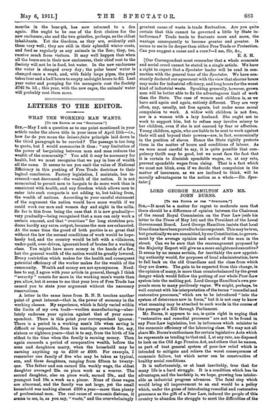LETTERS TO THE EDITOR.
WHAT THE WORKING MAN WANTS.
[To TER EDITOR OP THY"SPECTATOR."] Sin,—May I ask a question as to one point mentioned in your article under the above title in your issue of April 15th—i.e., how far do you mean the laissez-faire principle laid down in the third paragraph to be carried ? The passage is too long to quote, but I would summarise it thus: "any limitation of the power of bargaining between man and man reduces the wealth of the community." You add it may be necessary for health, but we must recognise that we pay in loss of wealth all the same. It seems to me you omit the value of National Efficiency in this pushing of Free Trade doctrines to their logical conclusion. Factory legislation, I maintain, has in- creased—not decreased—the wealth of the nation. It is not economical to permit men to bargain to do more work than is consistent with health, and any freedom which allows men to enter into such compacts is not adding to, but taking from, the wealth of nations. According to your careful statement of the argument the nation would have more wealth if we could work our men and women day and night in the rail's. So far is this from being the case that it is now gradually— very gradually—being recognised that a man can only work a certain amount, and that " overtime " for long stretches pro- duces hardly any extra output, because the men are exhausted. At the same time the greed of both parties is so great that without the law the normal conditions of work would be hope- lessly bad, and the country would be left with a villainous, under-paid, over-driven, ignorant herd of brutes for a working class. You might have more money in the hands of a few, but the general wealth of the nation would be greatly lowered. Every restriction which makes for the health and consequent potential efficiency of the worker makes for the wealth of the community. Wealth and money are not synonymous. Need- less to say, I agree with your article in general, though I think " security " counts for more in the working man's wants than you allow, but it seems to me that your love of Free Trade has caused you to state your argument without the necessary reservations.
A letter in the same issue from R. N. B. touches another point of great interest—that is, the power of economy in the working classes. My experience, which is fairly varied within the limits of my own trade—woollen manufacturing—abso- lutely endorses your opinion against that of your corre- spondent. There is this point your correspondent ignores : There is a period in a working man's life when saving is difficult or impossible, from his marriage onwards for, say, sixteen or eighteen years—that is to say, from the birth of his eldest to the time when the family is earning money. Then again succeeds a period of comparative wealth, before the sons and daughters marry, when the household may be earning anything np to £500 or £600. For example, I remember one family of five who may be taken as typical, son, and three daughters, ranging from fifteen to twenty- one. The father and son earned 25s. weekly wage, the eldest daughter averaged 25a. on piece work as a weaver. The second daughter, also on piece work, earned 20s., and the youngest had 10s. a week as a piecer. None of these wages are abnormal, and the family was not large, yet the small household was making almost £300 a year—more than plenty of professional men. The real cause of economic distress, it seems to me, is, as you say, " waste," and the overwhelmingly greatest cause of waste is trade fluctuation. Are you quite certain that this cannot be governed a little by State in- terference? Trade tends to fluctuate more and more, the wastage consequently to become greater and greater. It seems to me to lie deeper than either Free Trade or Protection. Can you suggest a cause and a cure P-1 am, Sir, dm,
E. S. H.
[Our Correspondent must remember that a whole economic and social creed cannot be stated in a single article. We have a right to expect that a Spectator leader will be read in con- nection with the general tone of the Spectator. We have con- stantly declared our agreement with the view that shorter hours may make for industrial efficiency, and long hours for the worst kind of industrial waste. Speaking generally, however, grown men will be better able to fix the advantageous limit of work than the State. The case of women and children is, as we have said again and again, entirely different. They are very often, nay, usually, not free agents, but under some moral compulsion to work. A widow with children is not free, nor is a woman with a lazy husband. She ought not to work to support him, but to refuse may involve misery to her children, even if she is not coerced by fear or affection. Young children, again, who are liable to be sent to work against their will and beyond their powers—are, in fact, economically in the position of slaves. Hence the State rightly protects them in the matter of hours and conditions of labour. As we were most careful to say, it is quite possible that com- pulsory thrift may be good, but we must face the fact that it is certain to diminish spendable wages, or, at any rate, prevent spendable wages from rising. That is a fact which we must not blink, even if we decide that compulsion in the matter of insurance, as we are inclined to think, will be morally advantageous to the nation as a whole.—En. Spec- tator.]










































 Previous page
Previous page